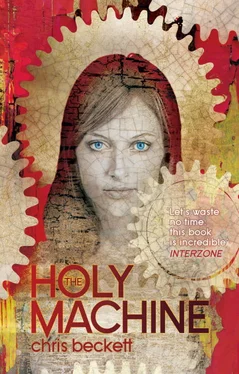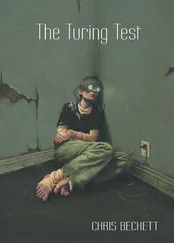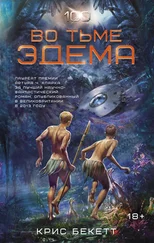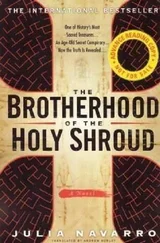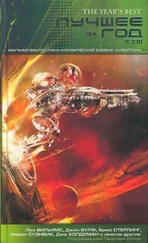‘Three hundred drachmai then,’ said Manolis, mistaking my lack of response for a bargaining ploy.
There were shrines beside the road. Murals of bleeding Christs. Even from Manolis’ mirror there dangled a Virgin Mary.
Everything looked dirty and run-down.
The women wore headscarves and long dresses.
Animals ran around in the road.
There was no mistaking it: I was in the Outlands.
We arrived in the town. There was a lake with an island on it. Beyond that a great bleak wall of mountains.
And all around seethed human life: old and young, rich and poor, shouting, laughing, haggling, talking, wailing. For a while we nudged slowly through this mass of humanity. Faces peered in through the windows. Mouths opened, treating me to views of bad teeth and antique dental work. Then the crowd grew denser and finally the taxi came to a halt at an intersection with a main road, immobilized by the sheer volume of people.
‘A saint’s day,’ Manolis explained.
We got out. Along the road in front of us, through a narrow gap in the crowd created by baton-wielding policemen and thuggish-looking monks, a procession was moving. Two priests in elaborate robes and long beards came in front swinging censers and after them, four more holding aloft a gilded case. People were running forward to touch the case, in spite of the policemen shouting and hitting out at them with their sticks. All around me people were crossing themselves and muttering incantations.
Encouraged by the taxi-driver I pushed nearer to the front.
The gilded case was just drawing level with me when I realized for the first time what it contained. Through a glass window at the front of it, the face of a desiccated corpse looked out. Not only was this a saint’s day but here was the saint himself in person.
I looked round at the driver, seeking an explanation, but he was crossing himself and muttering just like the rest.
On our side in the negotiations there were two not very senior officials from the Department of Trade, on theirs, three extraordinary-looking priests, utterly alien to my Illyrian eyes, with long hair and long beards and strange flowing robes. I was the interpreter for our side, using a small laptop translating machine as a crib (such machines can talk quite competently for themselves, incidentally, but Outland sensibilities are offended by talking to machines). On the Greek side the interpreter was another priest, younger than the others, and in fact not much older than myself, but equally medieval in appearance.
During interludes when the delegations withdrew to confer, I was left in the negotiating room with this man, and we were served tiny cups of coffee, accompanied by sweet cakes and glasses of water. At first we didn’t speak at all in these breaks. I would just sit and brood, mostly about Lucy. I now visited her twice a week, and I was already longing for my next visit. I tried to picture her face, her voice, her limbs, her breasts. I longed for her caresses, as if she were really human and I was really her lover.
And then, the fourth or fifth time we were left alone like that, the Greek suddenly spoke.
‘You will burn in hell, my friend,’ he growled softly in English, leaning over the negotiating table.
For moment I was really scared. It was as if he had been looking straight into my mind.
‘I… I beg your pardon?’
‘If you do not acknowledge Christ,’ the Greek said, ‘you will burn in hell…’
It was what my mother had been told on that bleak afternoon by Lake Michigan all those years ago. I laughed uncomfortably.
‘Don’t you have anything to say in reply?’ he demanded.
He had very deep and powerful eyes that seemed to bore straight through the thin veneer of my face.
I shrugged and blushed. ‘We Illyrians need things to be properly proved to us if we are to accept them as true. We can’t believe in things just because someone says we’ll burn in hell if we don’t.’
He laughed, angrily and without humour. ‘Well, if you want proof look at that City of yours where you live without God, and compare it with our Holy Epiros!’
I gaped at him in astonishment. Then I almost burst out laughing! How could anyone unfavourably compare our gleaming, prosperous, dynamic city, with this sordid pit of poverty and ignorance and disease?
‘My God,’ said my fellow interpreter, lapsing now into Greek, ‘I’ve even heard you have machines there that resemble women for men to fornicate with. You shut yourselves away from God and now you make a mockery even of love! Where else but in the lowest depths of hell could such perversions be tolerated?’
But the delegations were returning to the room.
I remember that night in the hotel I lay awake for a long time. It was a hot night, there was no air conditioning and my window was open. Smells and sounds came in from the street: roasted meat, shouting, crudely amplified Greek music, church-bells (even then, in the middle of the night!)…
Usually I would have comforted myself by thinking about Lucy, but the priest’s disgust and contempt were still fresh in my mind, and made it impossible for me to find any solace in that way. In fact I couldn’t even picture her as she seemed when I was with her. I could only think of what she really was, of what she was when I wasn’t there to see her.
I imagined her with all the other syntecs, the other Advanced Sensual Pleasure Units, sitting together in the darkness in that big red room after the House shut down at 3 a.m. Their blank wide-open eyes were staring straight ahead, reflecting the neon lights of the nightclub across the street – red, blue, pink, red, blue, pink – as the eyes of dolls and teddy-bears catch the light, but are otherwise without a flicker of life. And they were silent, silent at any rate to human ears, like statues in a mausoleum.
But far above the range of human hearing, the ASPUs were communicating after their fashion. In tiny ultrasound batsqueaks, one after another, they were downloading the day’s data to House Control.
I had my tour with Manolis the next day. He showed me all the tourist sites of Ioannina: the ruined castle of the Ottoman despot Ali Pasha, the churches, the dilapidated archaeological museum, the chapels and shrines on the little island in the lake.
I remember that the interior of one of the chapels was completely covered with murals from floor to ceiling, most of them depicting hideous scenes of saints being skinned alive, saints roasting over fires, saints being beheaded…
‘Look at the courage of our holy martyrs,’ said Manolis proudly, gesturing to a saint gazing steadfastly up to heaven while his tormentors disembowelled him. ‘It is faith in our Lord that gives them strength. You don’t understand that in that City of yours!’
And for a moment this idea humbled me, just as the fierce Greek interpreter had humbled me. I had a glimpse of what faith might mean: something strong for a person to hold onto beyond his own immediate needs and feelings…
But later, when we were back in Manolis’ taxi, it struck me that it wasn’t that simple. Scientific rationalism had steadfast martyrs of its own, after all, from Galileo to Mrs Ullman, who had suffered or died for refusing to pretend to believe in things.
* * *
Manolis showed me other things too, less exalted things, which he thought might tempt me. He showed me the town’s brothel, were several fat, bored-looking human whores were sitting outside in the sun. (‘I thought you might like a girl,’ he said, and I laughed coldly to myself at the very idea of being tempted by these wretched creatures, when I had Lucy waiting for me back home.) He took me on a tour of the town’s artisanal area. There was a street of tanners (with piles of discarded animal hooves outside each workshop), a street of potters, a street of mechanics…
Читать дальше
